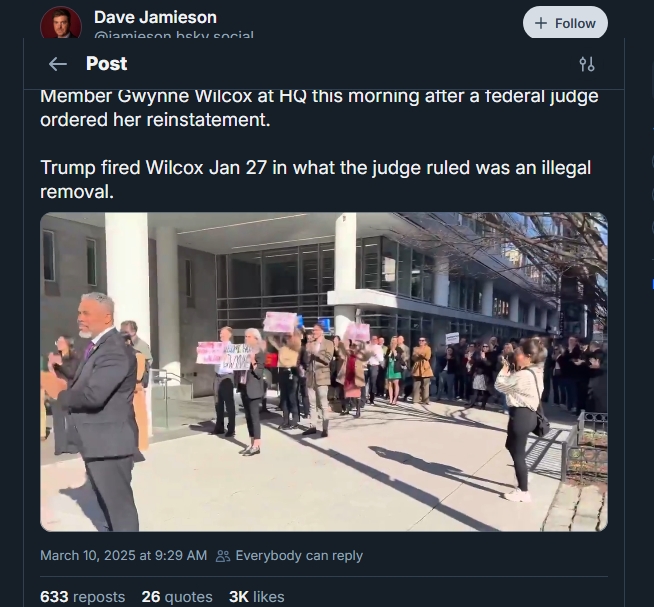Posts tagged Executive Branch
Judge rules Trump can’t eliminate federal workers’ union bargaining
June 27, 2025 // Siding with the American Federation of Government Employees (AFGE) and other unions, U.S. District Judge James Donato ruled that President Trump’s executive order letting several federal agencies dispense with union bargaining is likely unlawful. Donato wrote in a 29-page opinion that federal workers have had the right to unionize and collectively bargain for better employment conditions for more than 60 years, and Trump’s order threatened that “long-standing status quo.” The six unions that filed suit “appear to have been deemed hostile to the President,” he said.
Backgrounder: Trump Civil Service Reform Proposed Rule
April 27, 2025 // On April 23, 2025, OPM proposed a new rule to improve accountability for federal career employees, especially those in policy roles. The rule implements President Trump’s Executive Order 14171, which he signed on his first day in office. Executive Order 14171 explicitly directed OPM to render civil service regulations implemented during the Biden administration inoperative, citing the President’s authority to manage the executive branch. Among other things, the rule would create a new job category called Schedule Policy/Career in the excepted service for policy-influencing positions, making them at-will employees and, therefore, meaningfully accountable for their performance and conduct.
Union sues DHS to protect TSA screeners’ collective bargaining rights
March 18, 2025 // The lawsuit accuses the Trump administration of violating the Administrative Procedure Act’s prohibition on “arbitrary and capricious” decision-making, as well as breaching their contractual obligations under the 2024 collective bargaining agreement and in so doing, violating union members’ due process rights under the Fifth Amendment. The union also brings a First Amendment claim, arguing that the Trump administration’s decision to revoke TSA screeners’ collective bargaining rights was in retaliation for the union’s other lawsuits against the executive branch, most notably their challenge of the mass firing of probationary workers across government. A federal judge on Thursday issued a preliminary injunction in that case, requiring agencies to reinstate tens of thousands of improperly terminated workers.

Official Fired By Trump Returns To Work To Cheers After Judge Orders Reinstatement
March 11, 2025 // Wilcox filed a lawsuit seeking reinstatement, arguing her removal was unlawful. Judge Beryl A. Howell agreed with Wilcox, issuing an order last Thursday ensuring her temporary return to the agency as the underlying case moves forward. In a stinging opinion, Howell wrote that Trump failed to grasp the Constitution’s limits on executive power.
National Labor Relations Board Back to Quorum Strength as Member Wilcox Is Reinstated
March 11, 2025 // The statutory limitations swayed the judge, as did the Supreme Court’s 1935 decision in Humphrey’s Executor, where the Court upheld similar limits on the president’s ability to fire a Federal Trade Commission Official. In sum, Judge Howell ordered Wilcox’s reinstatement, giving the Board the quorum it lacked. This decision has implications for the President’s recent Executive Order seeking to vest all lawmaking power of Independent Administrative Agencies like the NLRB in the President’s office. Given the stakes here, the court’s decision is certainly not the final word, as President Trump’s team is expected to appeal, perhaps all the way to the Supreme Court, where they will argue that Humphrey’s Executor is distinguishable and that Board members do exercise executive authority and should therefore be in line with Presidential policies.
Op-ed: As unions fight reform, Trump should assert executive power
February 26, 2025 // Unfortunately, for decades, unions and their collective bargaining agreements have hamstrung presidents and the people they’ve chosen to run federal departments and agencies in all the wrong ways. Under a bill President Carter signed in 1978, the president cannot simply reject a proposed union agreement but must go before the Federal Service Impasses Panel, or arbitrator that can make him accept terms he doesn’t want. Also, union agreements prevent incompetent or unethical employees protected by a union from being fired or even having negative notes placed in their files without notice and an opportunity to bring grievance proceedings, where unions will back even the least deserving member to the hilt.
Still-Unreleased Union Deal Rains Cash on State Workers
June 28, 2022 // The still-unreleased deal between the Hochul Administration and the Civil Service Employees Association (CSEA), state government’s largest group of unionized workers, would award bonuses, backpay, and guaranteed raises the next three years, documents sent to union members show. The tentative agreement, which was negotiated behind closed doors, covers about 56,000 blue- and white-collar state employees in executive branch agencies, including SUNY.

Associated Builders and Contractors addresses Sen. Sanders Budget Committee Hearing and Misleading Allegations
May 8, 2022 // The CRA states that, once an agency rule is disapproved by Congress, such a rule may not be issued in “substantially the same form,” unless it is expressly authorized by a subsequent law. A regulatory action pushing for a new Blacklisting Rule, even if narrowly tailored to firms that have been accused of violating the NLRA––as referenced in the chairman’s letter––would most certainly run afoul of the CRA and be subjected to litigation and create additional uncertainty for federal contractors.
Deals with CT unions focus on keeping workers, not streamlining workforce
March 10, 2022 // Those bonuses aren’t the hazard or premium pay unions have sought for front-line workers who couldn’t telecommute during the worst of the coronavirus pandemic. Labor leaders and the administration still are negotiating that issue, and special pandemic pay still might be awarded in the future.
